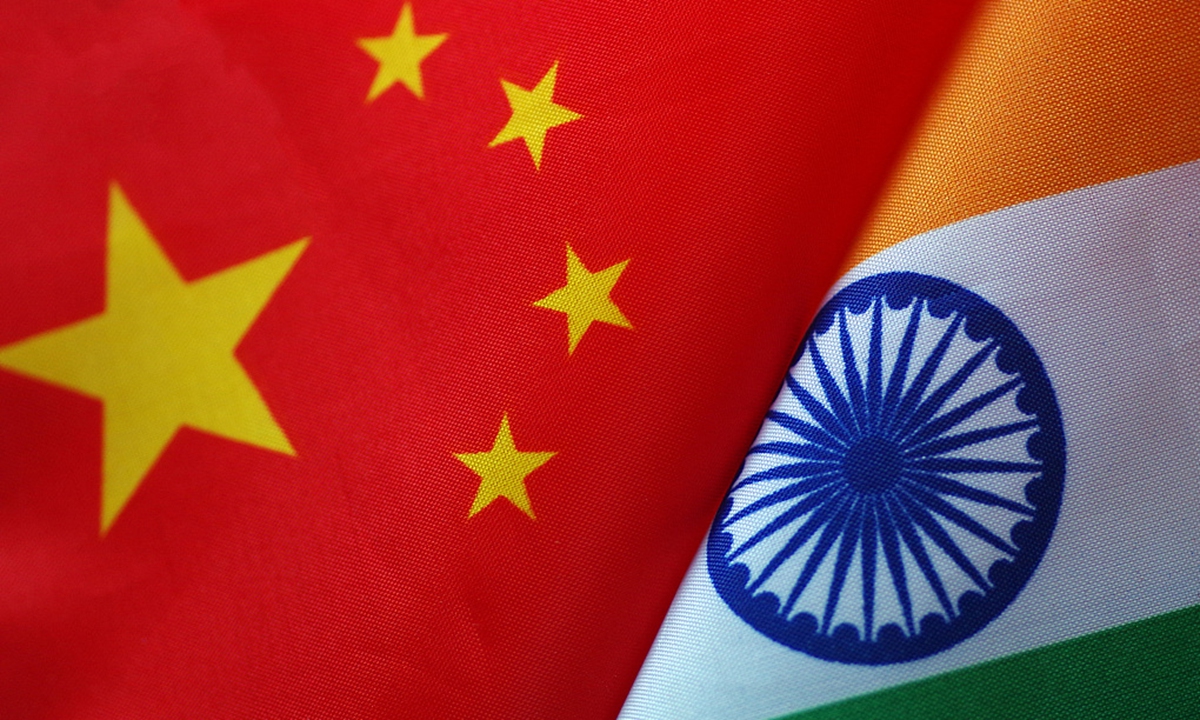Warning to Indian elites: ‘Taiwan card’ wrong play
By Long Xingchun Source: Global Times Published: 2020/10/22 21:52:10

China India. Photo: VCG
News emerged recently that India was considering trade talks with the island of Taiwan. This has triggered objections from China, with Chinese Foreign Ministry spokesperson Zhao Lijian saying on Tuesday that, "China is firmly opposed to any official exchanges of any form and the signing of any agreement of official nature between Taiwan and any country having diplomatic relations with China."According to a report of India's Economic Times on Wednesday, the administration of India's Prime Minister Narendra Modi has no plans to launch talks with the island of Taiwan for a trade deal. A source told this same Indian media outlet that reports that India may launch trade dialogues with the island are speculative and baseless.
It is wise for India at the official level not to consider developing ties with the island of Taiwan. If India holds trade talks with the island of Taiwan at official levels, this will violate the one-China principle as well as the Indian government's commitment to China.
The island of Taiwan wants to develop official ties with more countries so that it can gain bargaining chips in its relations with the Chinese mainland. But it has been proved that this is only Taiwan's wishful thinking. It is reported that the island of Taiwan is considering a trade deal with the US, but no actual progress has been made.
The economic ties between India and the island of Taiwan, including trade, are close. In 2018, the two sides signed an updated bilateral investment agreement in a bid to further expand economic ties. The Chinese mainland does not object to other countries developing trade and cultural ties with the island of Taiwan. If a trade deal is to be signed, it can be done by public institutions rather than government agencies. Once a country wants to develop official trade ties, it is by no means a purely trade issue.
Regarding the island of Taiwan, India can, at most, make speculative moves. It is not even in a position to play the "Taiwan card." It has no stakes in cross-Straits relations. Its exchanges with the island of Taiwan are no more than maneuvers - just like those recently attempted by certain officials in the Czech Republic.
So far, speculative moves regarding the island of Taiwan from India have mainly come from nongovernmental channels. The Indian government has not broken the one-China framework at the official level, except that India in July selected a senior diplomat as its new envoy to the island of Taiwan following the border tensions with China.
Certain Indian elites, including research fellows at think tanks, media staff and retired officials, are advocating a tough stance toward China, including playing the "Taiwan card." As early as in June, former Indian deputy national security adviser Arvind Gupta raised the idea that India should rethink and revise its one-China policy and exploit the geographic, ethnic, and economic fault lines within China - such as the Taiwan question.
These so-called elites are supposed to be playing a constructive, not destructive, role in China-India relations. But they simply blame China in a bid to cater to the anti-China sentiment in Indian society. But they do not see India's own diplomatic woes and can easily be misled by external forces. Since they are not in official position, they don't shoulder any responsibility should ties with China sour.
The Taiwan question will exert a much more detrimental impact on China-India relations than current border spats. Although border disputes have jeopardized bilateral ties, both sides are trying to manage divergences without heading toward hostility.
But if India supports Taiwan secessionist forces, China and India will come to hostility, especially if India's moves force China to support secessionist forces in India as a countermeasure. Mutual trust will be eroded. Each would attack the weakness of the other. They would hurt the core interests of the other.
The Indian government has to weigh the losses. India has to bear the consequences for resorting to the "Taiwan card." It is hoped that India can exercise restraint and use wisdom in handling its relations with China.
The author is a senior research fellow with the Academy of Regional and Global Governance at the Beijing Foreign Studies University and president of the Chengdu Institute of World Affairs. opinion@globaltimes.com.cn
Posted in: ASIAN REVIEW